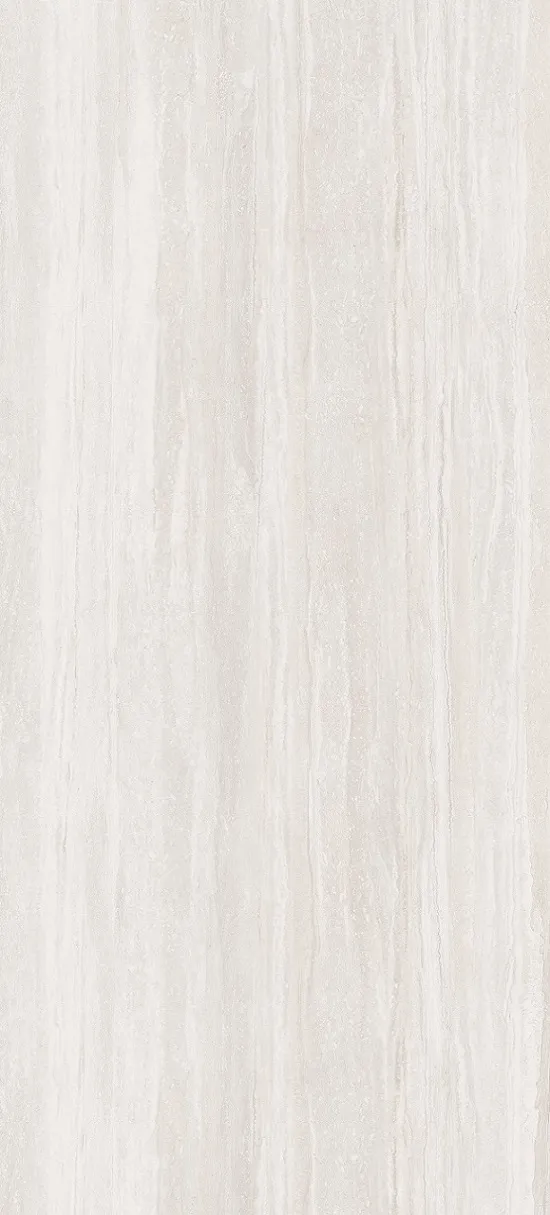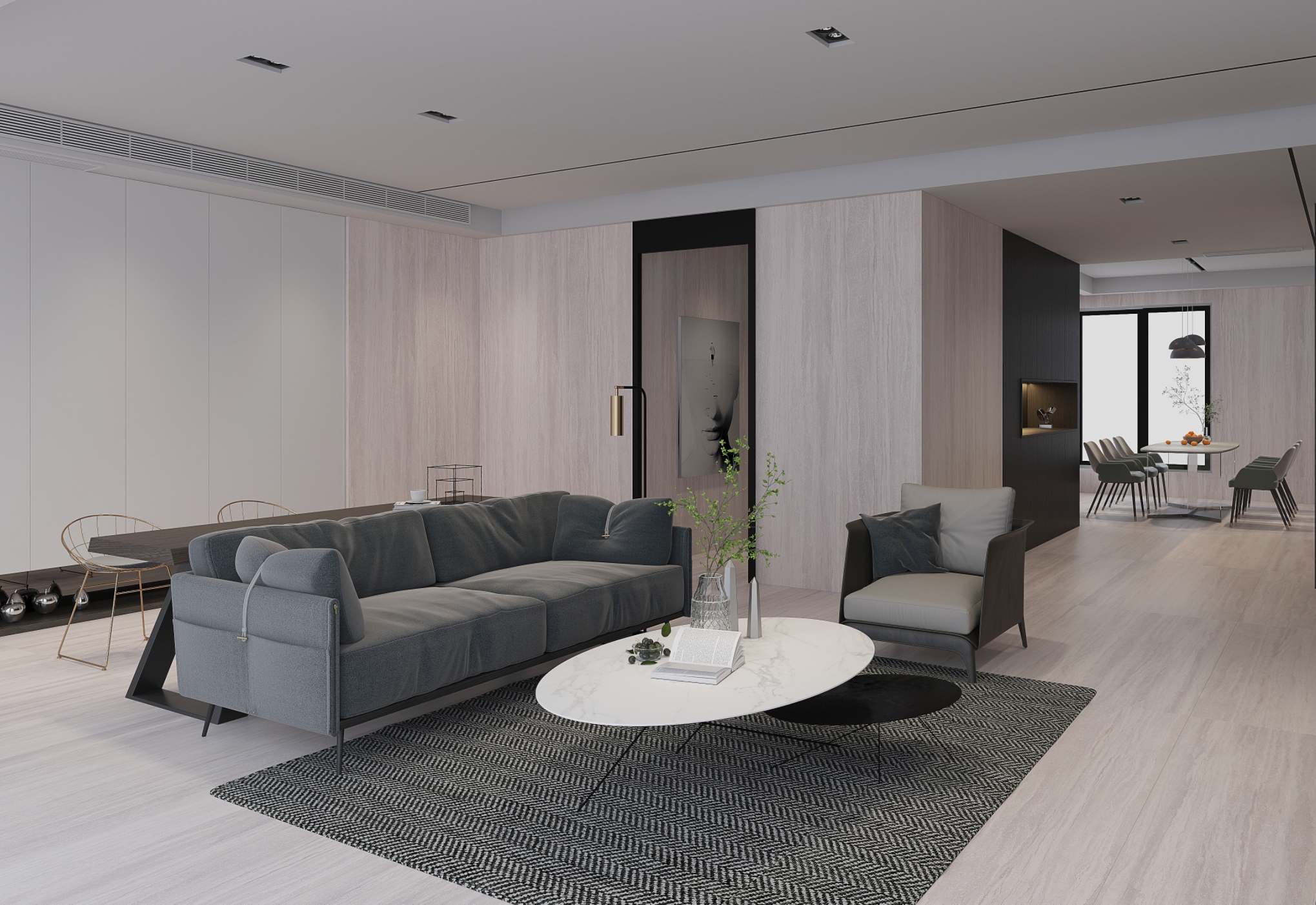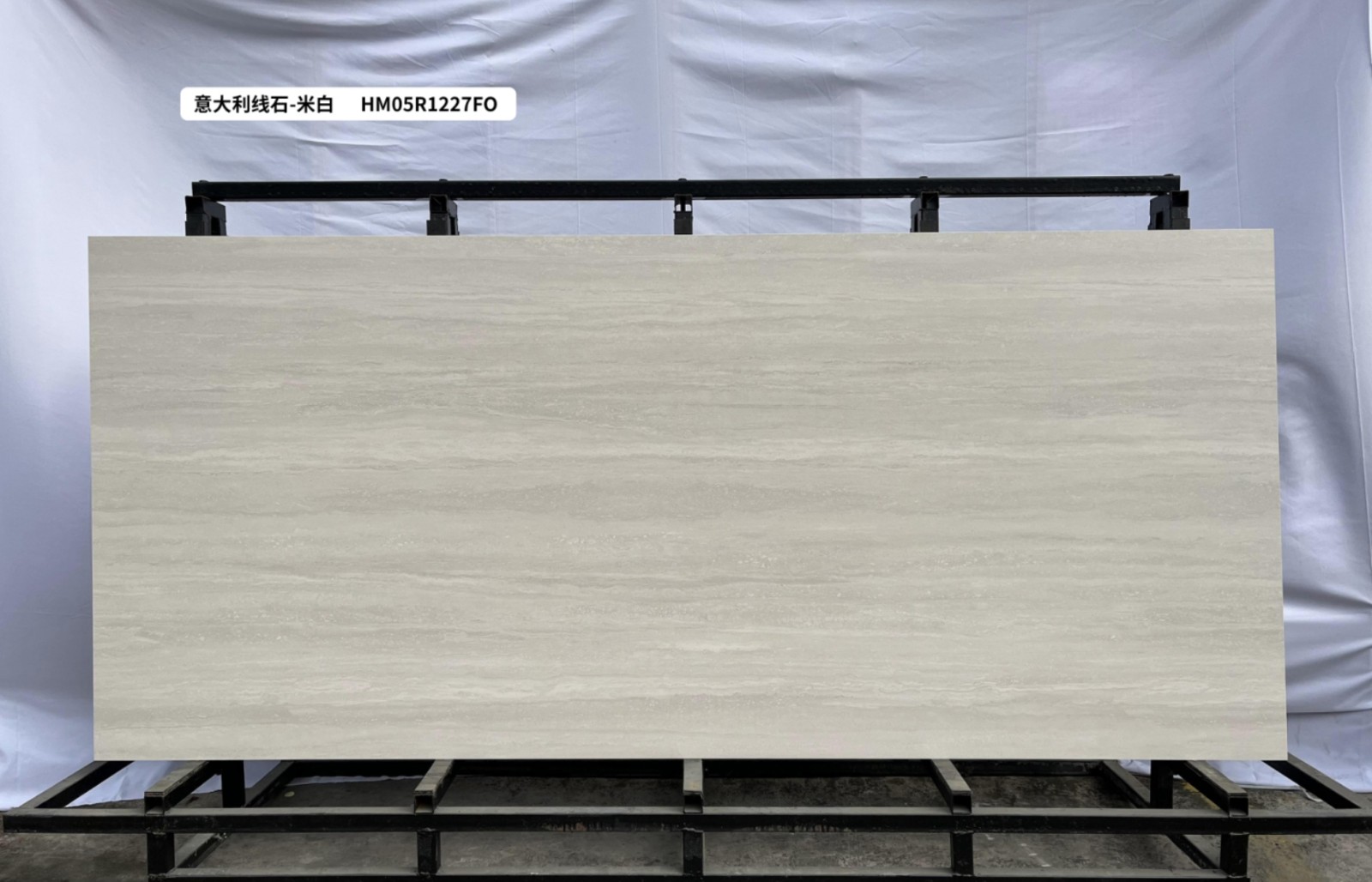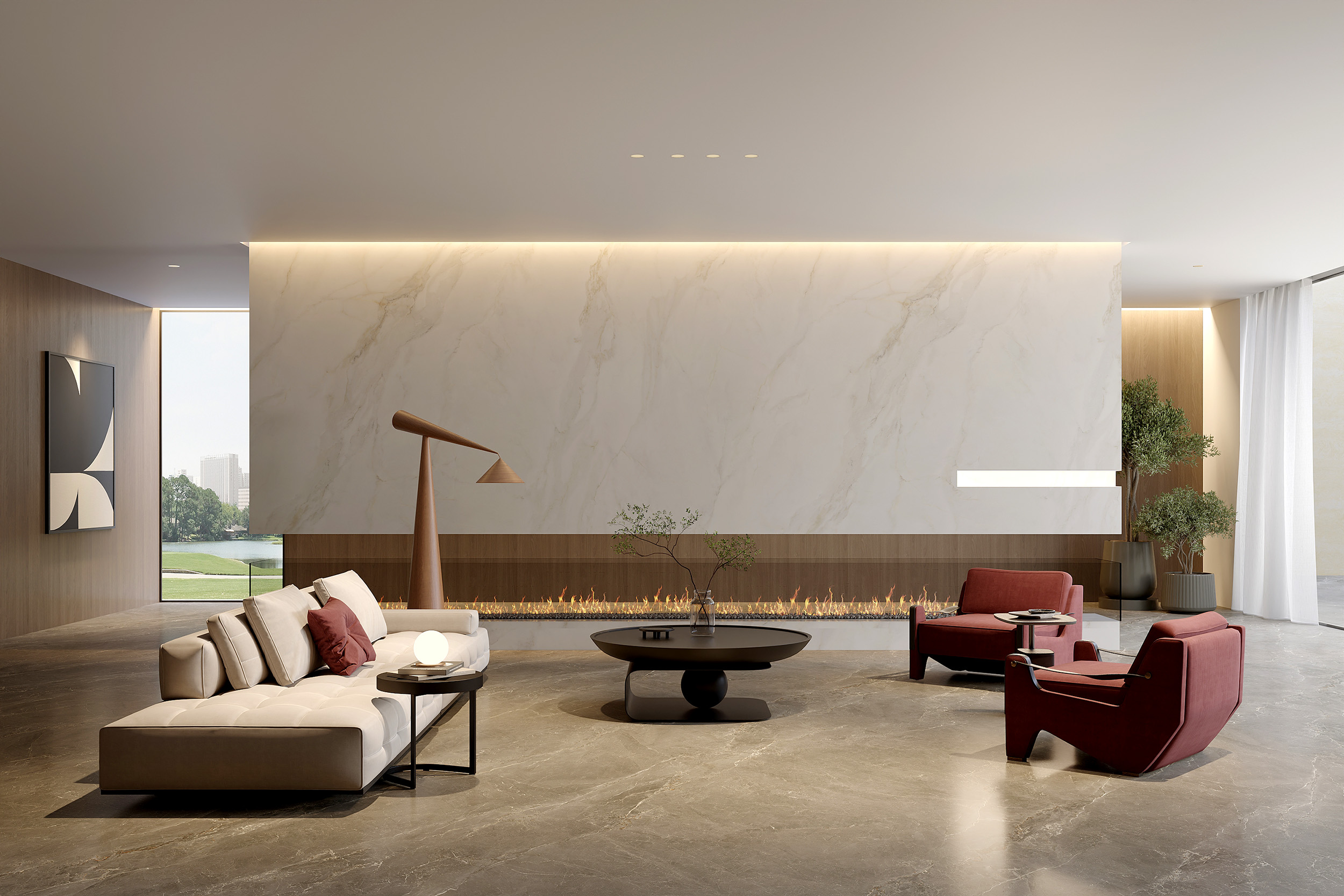Sintered stone flooring has become a popular material in modern home and commercial space renovations. Its high hardness, strong wear resistance, natural texture, and elegant aesthetic make it widely used in living rooms, kitchens, bathrooms, shopping malls, and even outdoor spaces. However, when choosing sintered stone flooring, many people have a common question: Is it slippery when wet?
This article will provide an in-depth analysis of sintered stone flooring from multiple perspectives, including its material properties, anti-slip properties, performance in wet environments, comparisons with other flooring materials, applicable scenarios, and maintenance methods. This will help readers fully understand the safety of sintered stone flooring in wet environments.

What is sintered stone flooring?
Sintered stone flooring is a new building material made by sintering natural minerals at high temperatures (above 1200°C) and high pressure. It has a dense structure and possesses extremely strong physical properties and chemical stability. Common characteristics of sintered stone flooring include:
• High hardness – With a Mohs hardness of 6-7, it is stronger than most natural stone.
• Abrasion resistance – The surface is scratch-resistant, leaving little scratching even after prolonged use.
• Water resistance – With a near-zero water absorption rate, it barely swells or deforms due to moisture.
• Fire and heat resistance – It withstands open flames and high temperatures without damage.
• Environmental and safety – Sintered using natural raw materials, it releases no harmful substances.
These characteristics lay the foundation for sintered stone flooring's performance in wet environments.

Is sintered stone flooring slippery when wet?
To determine whether a sintered stone floor is slippery when wet, it is important to analyze the following aspects:
1. The influence of surface finish
Sintered stone flooring's anti-slip properties vary depending on the surface treatment used. Common surface finishes include:
• Polished: The surface is glossy and mirror-like, offering excellent decorative properties. However, the coefficient of friction decreases when exposed to water, making it susceptible to slipping.
• Matte: The surface has a soft sheen and relatively high friction, making it safer when wet than polished surfaces.
• Dry Grain/Anti-Slip Surface: Surfaces with fine grain or a bumpy texture maintain good anti-slip properties even when wet. They are commonly used in bathrooms, kitchens, or outdoor areas.
Therefore, if you choose a polished sintered stone floor, there is indeed a certain risk of slipping when wet. Sintered stone floors with a matte finish or anti-slip treatment are safer in wet conditions.
2. Considering the Coefficient of Friction
The construction industry typically uses the coefficient of friction (COF) to measure a floor's anti-slip properties in dry or wet conditions. Generally speaking:
• A COF >0.6: Considered good anti-slip performance;
• A COF of 0.4-0.6: Moderate; caution is advised in wet conditions;
• A COF <0.4: Slip-prone and not recommended for wet areas.
Most matte or anti-slip sintered stone floors maintain a COF above 0.5 in wet conditions, which is in the upper-middle range. The coefficient of friction of polished sintered stone floors may drop to around 0.3 when wet, posing a higher risk of slips.
3. Location of Use and Foot Contact
• In high-humidity areas like bathrooms and kitchens, moisture and oil easily adhere to the floor surface, making sintered stone floors more slippery.
• In ordinary spaces like living rooms and hallways, even if there are occasional water stains, they won't remain damp for long periods, reducing the risk of slips.
• When using sintered stone floors outdoors, choose a non-slip finish to maintain good friction even when wet.
Conclusion: Whether a sintered stone floor is slippery when wet depends on the surface finish and the location of use. Polished surfaces pose a higher risk, while matte and non-slip finishes remain relatively safe in wet conditions.

Comparison of the Anti-Slip Performance of Sintered Stone Flooring with Other Flooring Materials
To gain a more intuitive understanding of the performance of sintered stone floors in wet conditions, it can be compared with common flooring materials.
1. Sintered Stone Flooring vs. Ceramic Tile
• Ceramic Tile: Low water absorption, even smooth polished tiles can be slippery when wet.
• Sintered Stone Flooring: Higher hardness, richer textures, and more effective anti-slip treatment, resulting in slightly better anti-slip performance than ordinary ceramic tile.
2. Sintered Stone Flooring vs. Natural Marble
• Marble: Mostly polished, making it very slippery when wet.
• Sintered Stone Flooring: Available in a variety of finishes, offering a superior anti-slip treatment.
3. Sintered Stone Flooring vs. Wooden Flooring
• Wooden flooring: Highly absorbent and easily deformed by moisture, but with high surface friction, it is relatively non-slip.
• Sintered Stone Flooring: Almost zero water absorption and no deformation, but the smooth surface does make it slippery when wet.
4. Sintered Stone Flooring vs. PVC Flooring
• PVC Flooring: Highly flexible and highly non-slip, remaining relatively safe even when wet.
• Sintered stone flooring: A hard material with no elasticity, it requires surface treatment to improve its slip resistance.
In summary, sintered stone flooring's slip resistance is superior to marble and some ceramic tiles, but slightly inferior to wood and PVC flooring. However, considering its overall performance, sintered stone flooring remains a reliable choice in humid environments.
Where sintered stone flooring is suitable for humid environments
Different environments require different slip resistance, and sintered stone flooring's diverse finishes can meet these needs.
1. Bathrooms and toilets
• Sintered stone flooring with a non-slip finish or dry grain is recommended.
• Maintains good traction even when the floor is frequently wet.
2. Kitchens
• Kitchens are prone to oil and water stains, so choose a matte or non-slip finish on sintered stone flooring.
• It is recommended to use a floor mat to further reduce the risk of slipping.
3. Living rooms and bedrooms
• Matte sintered stone flooring is an attractive option, offering moderate friction.
• It is generally less prone to prolonged moisture, making it safer.
4. Outdoor Patios and Gardens
• Anti-slip sintered stone flooring is suitable for rainy environments.
• Weather-resistant and wear-resistant.

How can you improve the safety of sintered stone flooring in wet environments?
Even if you choose a sintered stone floor with an anti-slip treatment, daily maintenance and usage habits will directly affect safety.
• Choose the appropriate surface treatment—Avoid using polished sintered stone floors in wet environments.
• Clean regularly—Keep the floor free of oil and water to reduce the risk of slipping.
• Add support measures—Install anti-slip mats or carpets in high-risk areas.
• Keep it dry—Mop up any accumulated water promptly, especially in bathrooms and kitchens.
• Avoid using harsh, abrasive cleaners—Some cleaners can reduce the floor's coefficient of friction, making the sintered stone floor more slippery.
Is sintered stone flooring slippery when wet?
The answer is not absolute. Its anti-slip performance depends primarily on the surface finish and the intended use scenario:
• Polished sintered stone floors are indeed slippery when wet;
• Matte and anti-slip sintered stone floors maintain good friction and safety even in wet conditions.
With appropriate surface finish selection and proper routine maintenance, sintered stone floors are completely safe for use in wet spaces such as bathrooms, kitchens, and outdoors.
Therefore, when selecting materials for renovations, if wet environments are a concern, it is recommended to prioritize sintered stone floors with anti-slip finishes. Incorporating daily cleaning and anti-slip measures ensures both the floor's aesthetics and durability, while also ensuring safety in homes and public spaces.
What services does WOWSLAB offer besides supplying marble slabs?
WOWSLAB provides full-service support for marble and sintered stone slab projects. Our company in China offers customized design consultation, slab production, installation guidance, and after-sales support. Buyers can purchase wholesale or single slabs, enjoy low prices, promotional discounts, and request detailed quotes.
Our professional team of over 30 staff members ensures smooth project execution, whether for residential or commercial applications.


